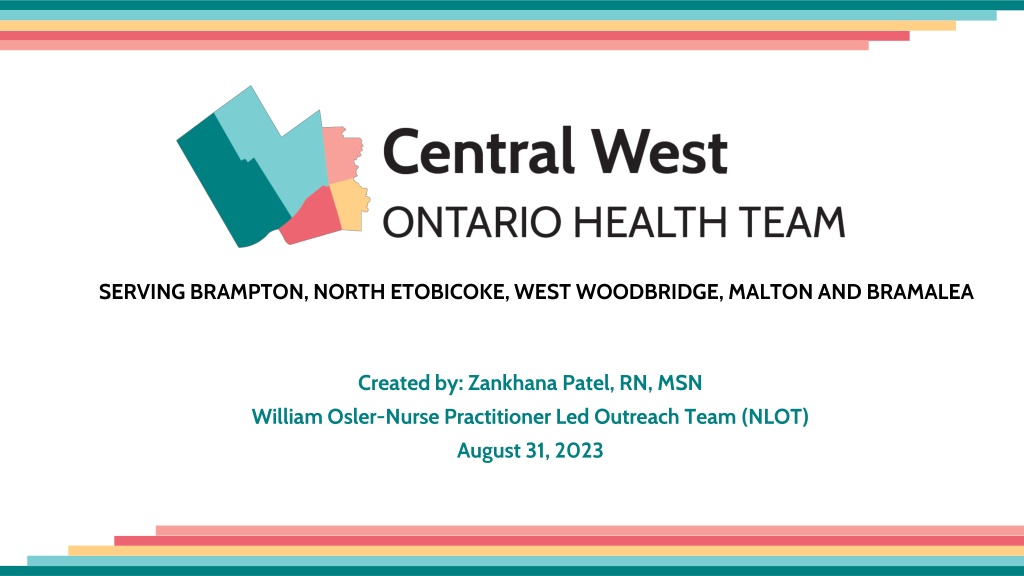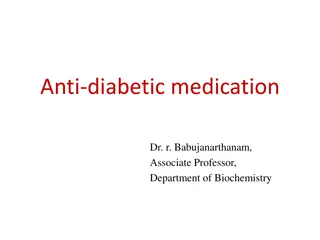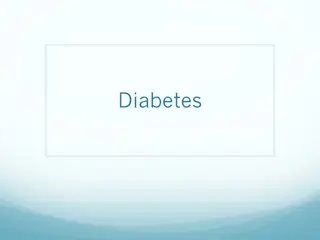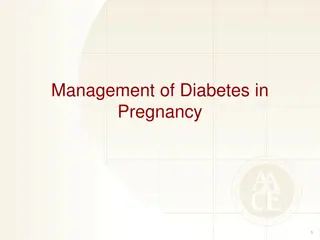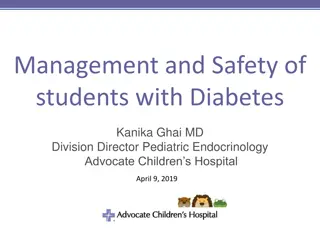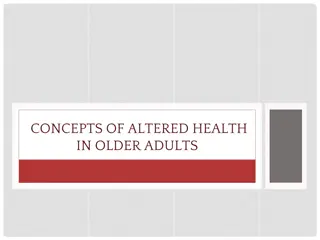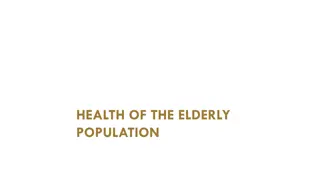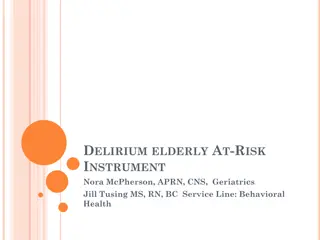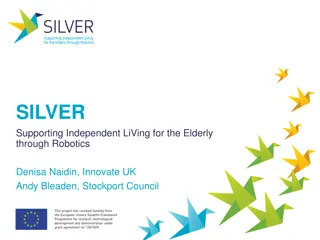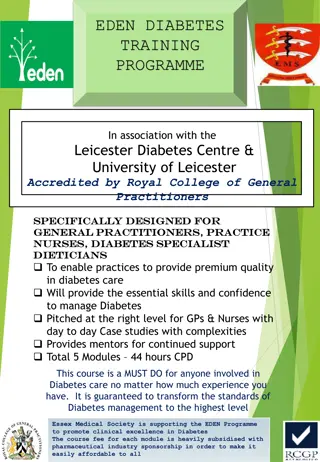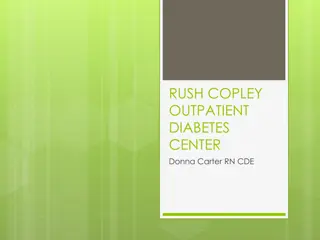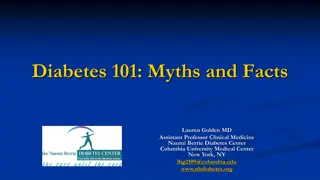Nursing Management of Diabetes in the Elderly
Providing specialized care for elderly patients with diabetes is crucial due to the increased risk of hypoglycemia. Understanding the definitions, classifications, and implications of diabetes in this population helps healthcare professionals develop effective treatment strategies and mitigate potential complications.
Download Presentation

Please find below an Image/Link to download the presentation.
The content on the website is provided AS IS for your information and personal use only. It may not be sold, licensed, or shared on other websites without obtaining consent from the author.If you encounter any issues during the download, it is possible that the publisher has removed the file from their server.
You are allowed to download the files provided on this website for personal or commercial use, subject to the condition that they are used lawfully. All files are the property of their respective owners.
The content on the website is provided AS IS for your information and personal use only. It may not be sold, licensed, or shared on other websites without obtaining consent from the author.
E N D
Presentation Transcript
SERVING BRAMPTON, NORTH ETOBICOKE, WEST WOODBRIDGE, MALTON AND BRAMALEA Created by: Zankhana Patel, RN, MSN William Osler-Nurse Practitioner Led Outreach Team (NLOT) August 31, 2023
SERVING BRAMPTON, NORTH ETOBICOKE, WEST WOODBRIDGE, MALTON AND BRAMALEA Nursing Management of Diabetes in LTC
Learning Objectives o Define and understand hypoglycemia o Identify risk factors and signs and symptoms of hypoglycemia o Review data for blood glucose control and complications o Review hypoglycemia consequences in the elderly o Review best treatment options for the elderly patients with type II diabetes
What is Diabetes? Classification of diabetes Type 1 diabetes: encompasses diabetes that is primarily a result of pancreatic beta cell destruction with consequent insulin deficiency, which is prone to ketoacidosis. This form includes cases due to an autoimmune process and those for which the etiology of beta cell destruction is unknown. Type 2 diabetes: may range from predominant insulin resistance with relative insulin deficiency to a predominant secretory defect with insulin resistance. Ketosis is not as common. Gestational diabetes mellitus: refers to glucose intolerance with onset or first recognition during pregnancy. (Diabetes Canada Clinical Practice Guidelines, 2018)
Canadian Diabetes Association: Diabetes Definition varies Administrative guidelines frequently classify people >65 years of age as elderly By 2030, number of individual > 65 years of age with DM is expected to increase significantly Age is associated with a decline in B-cell function (Diabetes Canada Clinical Practice Guidelines, 2018)
CDA: Definition of Hypoglycemia o The development of autonomic or neuroglycopenic symptoms o A low plasma glucose level (< 4.0mmol/L for patients treated with insulin) o Symptoms responding to the administration of carbohydrates o The severity of hypoglycemia is defined by clinical manifestations o Certain hypoglycemia events are more prevalent in elderly patients than in younger population (Diabetes Canada Clinical Practice Guidelines, 2018)
Clinical Definition of Hypoglycemia oMild oAutonomic symptoms present (i.e. palpitations, sweating, nausea, tingling) oModerate o Autonomic and neuroglycopenic symptoms (irritability, weakness, lethargy, confusion/delirium, glassy stare) oSevere oComa, seizure o Episodes treated with IV dextrose or glucagon, or episodes requiring administration of oral carbohydrate oHypoglycemia unawareness oCognitive symptoms without autonomic Sx (Diabetes Canada Clinical Practice Guidelines, 2018)
Symptoms of Hypoglycemia Neurogenic (Autonomic) Trembling Palpitations Sweating Anxiety Hunger Nausea Tingling Neuroglycopenic Difficulty concentrating Confusion/delirium Weakness Drowsiness Vision changes Difficulty speaking Headache Dizziness (Diabetes Canada Clinical Practice Guidelines, 2018)
Risk factors of hypoglycemia oRisk Factors oUse of insulin for DM management oMissed or irregular meals oAdvanced age oDuration of diabetes oImpaired awareness of hypoglycemia (Diabetes Canada Clinical Practice Guidelines, 2018)
Consequences of hypoglycemia o Consequences o Suboptimal glycemic control o Older adults with diabetes fail to perceive hypoglycemic symptoms o More likely to be diagnosed with dementia o Hypoglycemic episodes in elderly Risk for falls, delirium
Goals of Treatment of Hypoglycemia To detect and treat low BS level promptly by using an intervention that provides fastest rise in BS to a safe level Eliminates risk of injury & relieves symptoms quickly. Avoid over treatment can result in rebound hyperglycemia and weight gain (Diabetes Canada Clinical Practice Guidelines, 2018)
Hypoglycemia Management: Recommendations Mild to moderate: treated with oral ingestion of 15g of carbohydrates (3 glucose tabs/gels or orange juice) Wait 15 minutes before retesting BS level and retreat with a another 15g of carbohydrate if BS level remains < 4.0 mmol/L. Severe hypoglycemia in a conscious person treat with oral agents as noted above If patient unable to swallow by mouth glucagon injection Severe hypoglycemia with loss of consciousness If IV access available, give glucose 10-25g (20-50 mL of D50W) over 1-3 min (Diabetes Canada Clinical Practice Guidelines, 2018)
Insulin: Type 2 DM Management If treatment goals have not been reached by oral agents, insulin therapy should be initiated to improve glycemic control Combining insulin & oral antihyperglycemic agents is shown to be effective Insulin may be used as initial therapy in type 2 DM if A1C > 9.0% (Diabetes Canada Clinical Practice Guidelines, 2018)
Types of Insulins o Rapid Acting: oRapid Onset: 10-15mins oShorter duration of action: 4 hours oNovorapid, Humalog, Apidra o Short acting: Regular (Toronto) oRapid Onset: 30 mins oShorter duration of action: 6-8 hours (Diabetes Canada Clinical Practice Guidelines, 2018)
Types of Insulins o Basal: NPH Lantus (glargine), Levemir (detemir) oLess nocturnal hypoglycemia oLonger duration of action (compare to NPH) oOnce daily injection o Pre-mix insulin: Twice daily o i.e. 30/70, 40/60, 50/50, Novo Mix 30, Humalog Mix 25, Humalog Mix 50
Sick days & Diabetes Management o Sickness/infection causes hyperglycemia o Increase blood glucose testing o Fluid hydration o Carbohydrates intake if not eating regular meals o May need to adjust baseline doses of insulin o NO supplemental insulin (Sliding scale) recommended in LTC o Monitoring ketones: Urine/blood
Situation: What is the concern? Background: What do you know? Physician/NP Communication: SBAR Action/Assessment: What did you do? Assessment Interventions Recommendation/Request: What help is needed?
References Diabetes Canada Clinical Practice Guidelines Expert Committee (2018). Clinical Practice Guidelines for the Prevention and Management of Diabetes in Canada. Canadian Journal of Diabetes, 42(Suppl 1): S1-S325.
